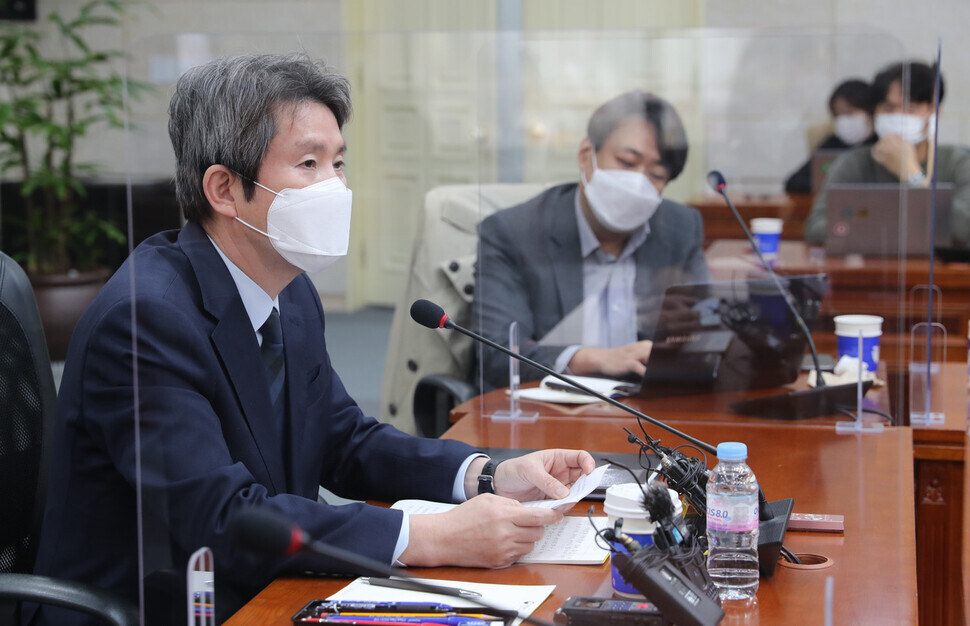hankyoreh
Links to other country sites 다른 나라 사이트 링크
Unification minister expresses hopes that US election will become turning point for inter-Korean relations

On Nov. 9, South Korean Unification Minister Lee In-young described the recent US presidential election as “a major inflection point for political change” and expressed his hope that this turning point will lead to an “inter-Korean era.”
“We expect the North Koreans will respond with prudence, wisdom, and flexibility during this time of transition,” Lee said in a press conference at the government’s office for inter-Korean dialogue in Seoul on Monday afternoon. This was Lee’s first official press conference since assuming his duties as the unification minister on July 27.
“There are concerns that Northeast Asian affairs may face volatility and uncertainty because of the time it will take for the next US administration to prepare its North Korean policy. But ironically, that could create an opportunity for South and North Korea to achieve peace. We have to make sure that happens,” Lee said.
“By taking the first step toward dialogue and building confidence, South and North Korea can initiate a better trend that could continue,” Lee added.
“We’re more hopeful about the fact that decreasing military exercises can be regarded as increasing the possibility of peace and dialogue,” a senior official at the Unification Ministry told reporters.
Significantly, this official expressed his hopes that the South Korea-US military exercises held every spring, which are regarded as a key indicator of North Korea-US relations and Korean Peninsula affairs, could be scaled back or canceled outright soon after the launch of the Biden administration.
“Since there could be [policy] inconsistencies between North Korea and the US, we need somebody to act as a mediator. I think that could be an opportunity for the South Korean government,” the official said.
“Now that the US presidential election is over, North Korea will have to make a decision, but that decision also depends on South Korea’s actions.”
“One question that’s particularly important is how much of a consensus we can reach with the US about the potential of the Korean Peninsula peace process. Another question is how much inter-Korean cooperation and dialogue we can envision and implement,” the official said.
“Biden was a strong supporter of former President Kim Dae-jung’s ‘Sunshine Policy,’” the official remarked, predicting that the Biden administration’s approach might be closer to that of Bill Clinton, who exchanged special envoys in a bid to set up a summit with North Korea, than to Obama’s “strategic patience,” which was marred by four North Korean nuclear tests.
“The objective situation is more important than the will of the parties concerned [in terms of North Korea’s actions going forward]. We expect there to be more objective factors leaving [North Korea] with no choice but to cooperate and engage in dialogue at the end of this year and the beginning of the next.” In short, this official expects the turn of the year to present an opportunity for dialogue and cooperation.
“North Korea has largely shut itself down in order to contain COVID-19. But it can’t develop its economy as long as it stays closed, so the important question is when, and how much, it opens up,” the official said.
By Lee Je-hun, senior staff writer
Please direct comments or questions to [english@hani.co.kr]

Editorial・opinion
![[Editorial] Penalties for airing allegations against Korea’s first lady endanger free press [Editorial] Penalties for airing allegations against Korea’s first lady endanger free press](https://flexible.img.hani.co.kr/flexible/normal/500/300/imgdb/original/2024/0502/1817146398095106.jpg) [Editorial] Penalties for airing allegations against Korea’s first lady endanger free press
[Editorial] Penalties for airing allegations against Korea’s first lady endanger free press![[Editorial] Yoon must halt procurement of SM-3 interceptor missiles [Editorial] Yoon must halt procurement of SM-3 interceptor missiles](https://flexible.img.hani.co.kr/flexible/normal/500/300/imgdb/child/2024/0501/17145495551605_1717145495195344.jpg) [Editorial] Yoon must halt procurement of SM-3 interceptor missiles
[Editorial] Yoon must halt procurement of SM-3 interceptor missiles- [Guest essay] Maybe Korea’s rapid population decline is an opportunity, not a crisis
- [Column] Can Yoon steer diplomacy with Russia, China back on track?
- [Column] Season 2 of special prosecutor probe may be coming to Korea soon
- [Column] Park Geun-hye déjà vu in Yoon Suk-yeol
- [Editorial] New weight of N. Korea’s nuclear threats makes dialogue all the more urgent
- [Guest essay] The real reason Korea’s new right wants to dub Rhee a founding father
- [Column] ‘Choson’: Is it time we start referring to N. Korea in its own terms?
- [Editorial] Japan’s rewriting of history with Korea has gone too far
Most viewed articles
- 160% of young Koreans see no need to have kids after marriage
- 2Presidential office warns of veto in response to opposition passing special counsel probe act
- 3Months and months of overdue wages are pushing migrant workers in Korea into debt
- 4Hybe-Ador dispute shines light on pervasive issues behind K-pop’s tidy facade
- 5Japan says it’s not pressuring Naver to sell Line, but Korean insiders say otherwise
- 6[Reporter’s notebook] In Min’s world, she’s the artist — and NewJeans is her art
- 7[Editorial] Penalties for airing allegations against Korea’s first lady endanger free press
- 8Inside the law for a special counsel probe over a Korean Marine’s death
- 9OECD upgrades Korea’s growth forecast from 2.2% to 2.6%
- 10[Exclusive] Hanshin University deported 22 Uzbeks in manner that felt like abduction, students say